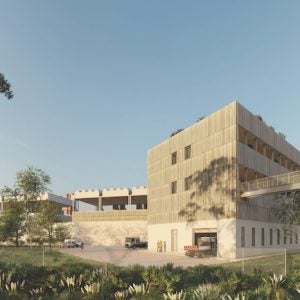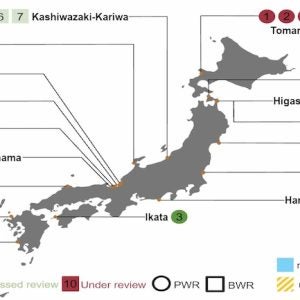In August the Lieberose solar farm in the state of Brandenburg officially became Germany’s largest solar power plant and the second largest in the world. The occasion was the placement of solar panel number 560 000 in the project by Germany’s Infrastructure minister Wolfgang Tiefensee and Brandenburg minister president Matthias Platzeck.
The solar farm, still under construction (in Turnow-Preilack, near Cottbus) is in several ways a landmark project for the solar industry. Despite the the current economic and financial crisis, two companies, juwi group and First Solar, are building a utility-scale project with a total investment volume of more than r160 million. Its maximum output of around 53 MW ranks it second among the world’s PV installations after the 60 MW Olmedilla photovoltaic park in Spain, which opened in 2008. And Lieberose is not the only huge solar facility in Germany’s fleet. When the new Strasskirchen solar field in Bavaria comes on line in 2010 as scheduled that plant at 54 MW will scrape in ahead of Lieberose.
Advanced modules
First Solar manufactures solar modules with what it describes as an advanced semiconductor technology and provides PV solutions that it says significantly reduce solar electricity costs. The company helped to finance this project. “We aim to help enable a global power supply with clean and cost-efficient solar energy. The Lieberose project alone will help save about 35 000 tons of CO2 per year,” said First Solar managing director Stephan Hansen. Developer the juwi group started as a two man operation in 1996 and has grown into an internationally active group in renewables with around 500 employees and an annual turnover of more than 400 million euros. To date, it has installed more than 300 wind turbines producing over 450 MW, and around 800 PV systems totalling more than 220 MW.
“The Lieberose project demonstrates the success of Germany’s strategy of combining local production of renewable energies with other strengths, including the knowledge and expertise that resides in local companies, networks, research organisations and universities” Herr Tiefensee told 300 invited guests at the official inauguration.
Military recycling
“Lieberose is also a model site in the conversion of military and other unused land” said Herr Platzeck. “Land that was contaminated and off limits for years is being cleared of munitions and other pollution without any financial burden on the owner of the land, the state.” The project is being developed on the largest former military training site of the Soviet army in Germany. Due to the relatively low investment and operating costs, it is possible to pay Brandenburg an attractive lease that finances the restoration of the site, including the removal of metal and soil contaminated by leftover grenades, shrapnel and munitions. After the end of the lease period, the solar farm can be removed, restoring the land to its natural state.
Logistics
As general contractor, juwi partner juwi Solar GmbH has been responsible for planning, logistics, supervising construction and delivering the finished solar farm, which is expected to be sold to an investor upon completion. “Solar farms such as Lieberose are very important for the future of all of the renewable energies,” said juwi CEO Matthias Willenbacher. “By their size and the efficiency with which the solar panels are produced, they contribute to significantly lower prices and to accelerating the advent of competitive solar electricity. This clearly increases the acceptance of solar energy”.
Lieberose was scheduled to be fully operational by the end of 2009. On completion its 700 000 thin film modules, most of which were made in First Solar’s nearby Frankfurt factory, will produce enough electricity to cover the equivalent electricity needs of about 15 000 households.






